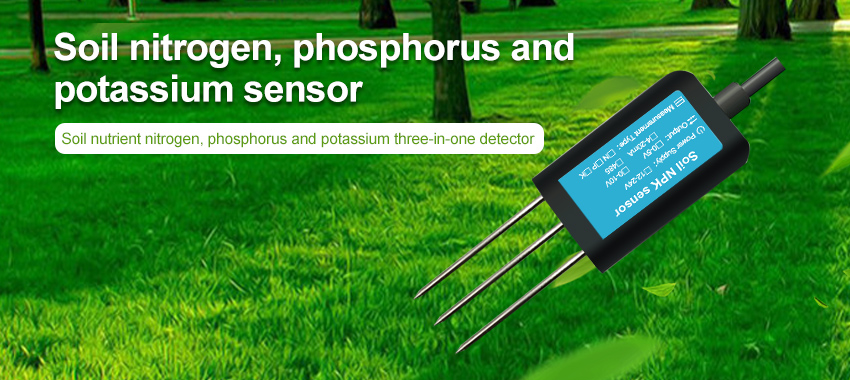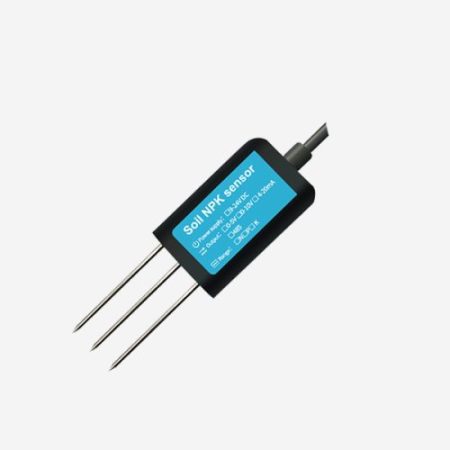NPK sensors have become a valuable tool for accurately measuring nitrogen (N), phosphorus (P), and potassium (K) levels in soil. In modern agriculture, optimizing nutrient management is critical to maximizing crop yields and reducing environmental impact. The purpose of this paper is to discuss the function and significance of NPK sensor.
The function and significance of NPK sensor
Precise Nutrient Monitoring:

NPK sensors enable farmers to accurately monitor N, P, and K levels in the soil, providing critical information about the nutrient status. These sensors employ advanced technologies, such as optical sensors, electromagnetic conductivity measurements, or spectroscopic techniques, to analyze the soil composition. By obtaining precise nutrient data, farmers can make informed decisions regarding fertilizer application, leading to improved crop health and optimized nutrient utilization.
Targeted Fertilizer Application:
By utilizing NPK sensors, farmers can implement precision agriculture techniques. Rather than applying fertilizers uniformly across the entire field, they can tailor the application based on the specific nutrient requirements of different areas. NPK sensors provide real-time measurements, allowing farmers to map nutrient variations within the field. This targeted application minimizes fertilizer waste, reduces costs, and prevents over-application that can lead to nutrient runoff and environmental pollution.
Timing of Nutrient Applications:
NPK sensors also aid in determining the optimal timing for nutrient applications. By monitoring nutrient levels throughout the growing season, farmers can identify periods of high demand or deficiencies. These sensors provide timely information, enabling farmers to adjust fertilizer applications accordingly. This ensures that crops receive nutrients when they need them the most, promoting healthy growth and minimizing nutrient losses.
Improved Crop Yield and Quality:

Effective nutrient management facilitated by NPK sensors leads to improved crop yield and quality. By providing accurate measurements of NPK levels, farmers can fine-tune fertilizer application rates and schedules, ensuring crops receive the necessary nutrients for optimal growth. This precision approach minimizes nutrient imbalances, deficiencies, or excesses that can hinder crop productivity and quality. As a result, farmers can achieve higher yields and produce crops with better nutritional profiles.
Environmental Stewardship:
NPK sensors play a vital role in promoting environmental stewardship within agriculture. By optimizing nutrient management, farmers can reduce fertilizer usage and minimize the risk of nutrient runoff into water bodies. This helps protect water quality and prevents the eutrophication of aquatic ecosystems. Additionally, precise nutrient monitoring and targeted fertilizer application reduce greenhouse gas emissions associated with fertilizer production and usage, contributing to overall sustainability.
Cost Efficiency:
NPK sensors offer cost-effective solutions for farmers. By providing detailed information about soil nutrient levels, these sensors enable farmers to optimize fertilizer use, resulting in reduced input costs. Farmers can avoid unnecessary expenditure on excessive fertilization while still ensuring adequate nutrient supply to crops. The long-term cost savings achieved through efficient nutrient management can significantly benefit agricultural operations.
Data Integration and Decision Support:
Modern NPK sensors often come equipped with data integration capabilities, allowing farmers to integrate the sensor data with other agronomic information systems. This integration provides a comprehensive view of soil conditions, nutrient requirements, and crop performance. Farmers can leverage this data to make informed decisions, such as adjusting fertilizer rates, selecting appropriate crop varieties, or implementing soil management practices to enhance overall farm productivity.
Conclusion:
NPK sensors offer precise nutrient monitoring, targeted fertilizer application, improved crop yield and quality, environmental stewardship, cost efficiency, and data integration capabilities. These sensors empower farmers with accurate information regarding N, P, and K levels, supporting informed decision-making for optimal nutrient management. By utilizing NPK sensors, farmers can enhance agricultural efficiency, minimize environmental impact, and sustainably meet the global demand for food production in a resource-efficient manner.
